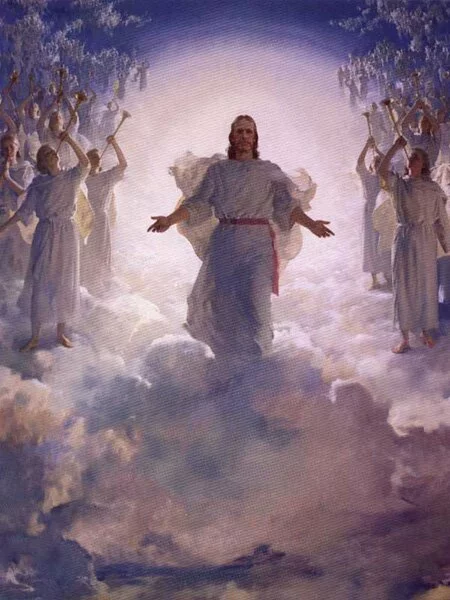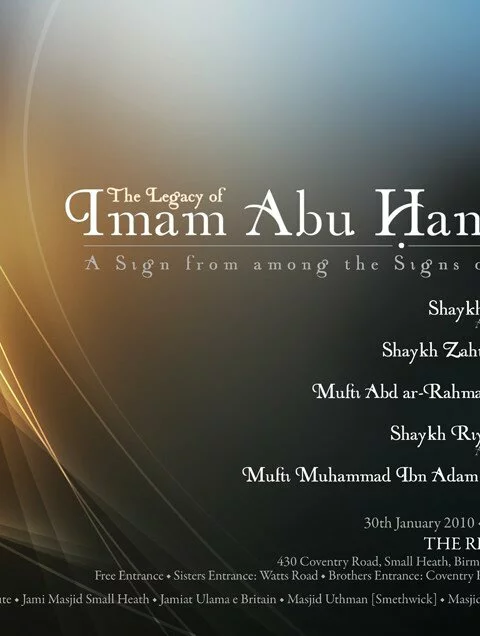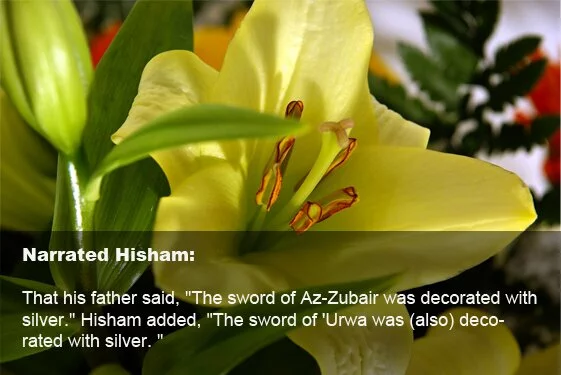Talha ibn ‘Ubaydallah (radhiallahu `anhu) reported that two men came to the Prophet (sallallahu `alayhi wa sallam) who had accepted Islam at the same time. One of them used to partake in Jihad more-so than the other, and so (one day) he fought in a battle and was martyred therein. The other remained behind him for another year, and then he passed away. Continue Reading →
Category Archives: Sahaba
Al-Imam Al-A’zam, Abu Hanifah (r.a.)
Nuʿmān ibn Thābit, recognized in the Muslim Umma as Al-Imam-A’zam, Abu Hanifah (r.a.), was the first ahl-Sunnah Imam, born in Iraq in 699 A.D. In his childhood, he memorized Holy Qur’an and was counted among the brilliant intellects of that era. Being a sharia scholar, he laid down the foundations of Sunni Hanafi institution. His institute was established and specialized in Islamic jurisprudence under the Abassid dynasty that had provided brilliant legal minds like Seljuk and Kharzem Shah. This scholarly institute was first established in Iran; afterwards the laws that were developed under the umbrella of Hanafi School were started practiced entirely in Islamic World.
After strengthening the Hanafi law institute in Iran, the legal system established under this School gained recognition and acceptance in Iraq after which it spread to most parts of eastern region. The whole Islamic jurisprudence system gained immense popularity when inserted in the administration of Government and public legal structure of Damascus. Under the ruling of Muhammad Ali Pasha in Egypt, Hanafi institute and its legal concepts gained accredited certification. Under the enlightened supervision of Al-Imam Al-A’zam, Abu Hanifah (r.a.), the Islamic legal system fetched elevated credibility thus the success of Hanafi School happened to be possible due to the clear visions and passion for Islamic knowledge by him.
Al-Imam Al-A’zam, Abu Hanifah (r.a.) was started on his education in Islamic studies at an early age. His scholarly aptitude pushed him towards the infinite knowledge of spirituality thus his divine interests gained him the assistance of Imam Shabi and his intellectual deep knowledge about religious studies. Imam Shabi recommended Al-Imam Al-A’zam, Abu Hanifah (r.a.) to study the valuable cannons of Islamic foundation to seek exquisite pearls of deep knowledge hidden in the depths of the Islamic sea. Hammad Ibn Abi Sulaiman, known for his scholarly Islamic laws, was the next influential teacher that taught Al-Imam Al-A’zam, Abu Hanifah (r.a.) about Islamic legal structure.
Abu Hanifah (r.a.) was under the teachings of Hammad approximately for 28 years. During this whole tenure Abu Hanifah (r.a.) was attached to Hammad like a shadow, thus he polished his knowledge of Islamic laws under Hammad’s excellence and brilliance. Afterwards he approached Makah and then started to raise his levels of education in Islamic regulations even higher under many scholars of Makah.
Some popular Hadiths of Al-Imam Al-A’zam, Abu Hanifah (r.a.) that exist in Islamic History are:
- The accomplishment of a task depends upon the hidden objective of the inner soul of a person.
- The completion of a Muslim faith is attached with the good deeds with his/her brother. A person who does not differentiate while making choice for him or her -self and his/her brother should congratulate him or her -self for being the truest Muslim from heart and soul.
- If you love Allah, remove discrimination in the inner and outlook of your personality.
Why Did The People Of Kufa Betray Imam Hussain (as) ?
Here is the summary of the clip above.
Yazid orderered, managed, oversaw, led, gained, trained, and maintained a force that massacred our beloved Imam Husayn (as).
Now, that force consisted of two main groups of people:
1- A group of mercenaries that were loyal to yazid and came over from all over.
2- Majority were people of Iraq, who had given oath and promise to Imam Husayn(as), that if he comes to Iraq, they will fight the Ummayads under his banner till death. Those people were “so called shia” or whatever they call themselves. They, under money and political power promises, gave up Imam Husayn’s promise and oath, aand instead fought under the banner of Yazid and participated in the massacre. Some of them repented, some did not. But that is a fact. Those people called themselves Shia of Imam Husayn. It is quite apparent, that they were Shia of Shaytan and Yazid, not Imam Husayn.
The Boy Who Raised First Sword for the Cause of Allah – Zubair Bin-Ul-Awam (RA)
Zubair bin-ul-Awam (RA) was one of the closest related persons to the Holy Prophet Muhammad (SAW). He (RA) is one of the most famous and respectable personalities of Islam. He (RA) served his whole life for the betterment and establishment of Islam. He (RA) was one of the favorite companions of Rasool Allah (SAW) who awarded Zubair with the title of Hawari-e-Rasul meaning the disciple of the messenger of Allah.
He (RA) was related to the Holy Prophet (SAW) in many ways. Firstly, he (RA) was the cousin of the Holy Prophet (SAW) as he was the son of Safiyah (RA) the aunt of the Holy Prophet (SAW). Khadijatul Kubra the wife of the Holy Prophet (SAW) was the aunt of Zubair bin-ul-Awam (RA) so the Holy Prophet (SAW) became his uncle. He (RA) was also the brother-in-law of the Holy Prophet (SAW) as the sister of Hazrat Ayesha (RA) was married to him. He (RA) also had ancestral relations with the Holy prophet (SAW). Belonging to a family, which was very close to the Holy Prophet (SAW) it was quite natural that he also accepted and embraced Islam. He (RA) accepted Islam between the age of 12 and 16 years. His father died when Zubair (RA) was still a child. His mother Safiyah (RA) made him a tough and brave man.
The Bravery of Zubair (RA)
Hazrat Zubair (RA) was a brave person since childhood and there are many examples of his immaculate bravery. As Rasool Allah (SAW) declared that, he was the one who raised the first sword against the antagonists in Makah when he was just sixteen. He had deep love and affection for the last prophet and his religious preaching.
Zubair and the Zuberi Clan
The history of Zubairi family is traceable to the time of Last Prophet of Islam. Hazrat Zubair had a large family with 21 children out of 12 were male and 9 of them were female children. Three of his male children became much popular as one became the caliph at Makkah called Abdullah, second son became the governor of Kufa called Musab and the third son became the famous historian of Islam called Urwa. Zubairi clan is present in the Indian Sub continent, Middle East, UK and USA. One of the famous saints in Zubairi clan is called Hazrat Sheikh Samauddin Zuberi from the 14th century AD.
The Blessed Month of Ramadan al-Kareem
1. Hadrat Abu Hurairah reported that the Messenger of Allah has said, “When Ramadan begins, the doors of heaven are opened.” A version has, “the doors of Paradise are opened and the doors of Hell are closed, and the Satans are tied with chains.” Another version has, “the doors of Mercy are opened.” [Sahih al-Bukhari Vol 1, Page 255 and Sahih al-Muslim, Vol 1, Page 346] Continue Reading →
Ramadan : Hasten the Breaking of the Fast
It is narrated from Sahl bin Sad (radiyAllaahu anhu): Allah’s Apostle (salallaahu ‘alaihi wa salam) said: “The people will remain on the right path as long as they hasten the breaking of the fast.” [Bukhari: Book 3 Vol 31 #178; Muslim: Book 6 #2417]
It is narrated from Abu Hurayrah (radiyAllaahu anhu) that The Prophet (salallaahu ‘alaihi wa salam) said: “Religion will continue to prevail as long as people hasten to break the fast, because the Jews and the Christians delay doing so.” [Dawud: Book 13 #2346]
Abu ‘Atiyya (radiyAllaahu anhu) reported: I and Misruq went to ‘A’isha (radiyAllaahu anha) and Masruq said to her: “There are two persons among the Companions of Muhammad (may peace be upon him) none of whom abandons the good, but one of them hastens to observe sunset prayer and break the fast, and the other delays in observing the sunset prayer and in breaking the fast”, whereupon she said: “Who hastens to observe sunset prayer and break the fast?” He said: “It is ‘Abdullah.” Upon this she said: “This is how the Messenger of Allah (may peace be upon him) used to do.” [Muslim: Book 6 #2419, 2420]
Saying the Pious Predecessors:
Sa’id b. Al-Musayyib reports from his father, “I was once sitting with ‘Umar when a group of people arrived from Al-Sham. ‘Umar enquired about them and how they were; he asked, ‘Do the people of Al-Sham hasten to break the fast.’ He said, ‘Yes.’ [‘Umar] said, ‘They will not cease to remain upon good as long as they do this, and do not wait for the stars [to come out] as the people of Iraq do.’” [‘Abd Al-Razzaq Al-San’ani, Al-Musannaf 4:225.]
‘Amr b. Maymun Al-Awdi reports, “The Companions of Muhammad – Allah’s peace and blessings be upon him – used to be the quickest to break the fast and the slowest in taking the pre-dawn meal.” [Ibid. p226.]
Ibn Al-Musayyib also reports that ‘Umar wrote to the commanders of the various regions, ‘Do not be of the procrastinators when breaking the fast, and nor of those who wait for the stars before they start praying [al-maghrib].’ [Ibid. p225.]
Musa b. Anas reports that Anas [ibn Malik] used to have his slave-girl go to the top of his house, instructing her, ‘When the horizon becomes even (evenly lit, marking sunset), tell me.’ [Ibn Abi Shaybah, Al-Musannaf 2:430.]
Abu Al-Tiyah Al-Daba’i reports that “he used to break fast with Ibn ‘Abbas during Ramadan. When evening approached he would send a girl from his household to the roof [to look out], and when the sun set he would make the call to prayer (adhan). He would eat with us, and when he had finished, the call for the commencement of prayer (iqamah) would be given, and he would pray, and we would pray with him.” [Ibid. p429.]
Source: navedz.wordpress.com






